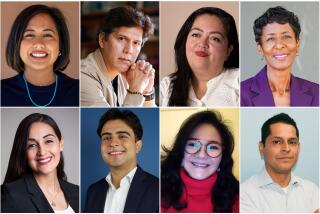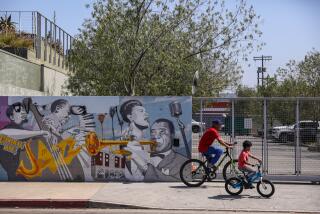On Eve of Mayor’s Race, Los Angeles Is Up for Grabs : Politics: Behind the spectacle of 52 candidates vying to replace Tom Bradley, a more serious--and ultimately hopeful--reality lies.
- Share via
It is perhaps too easy to ridicule at least 40 of the 52 citizens of Los Angeles who have declared themselves candidates for mayor. Far from being comic, the crowded field is deeply moving. Obviously, no more than a dozen or so of these candidates, given the realities of politics, are capable of mounting credible campaigns. As in most mayoral elections, some of the candidates, including one woman who describes herself as a “Dancing Landmark,” have entered the primary to express their idiosyncratic selves. Every mayoral election, at least in its earlier phases, possesses an element of civic festival--a Halloween or Purim of politics--in which some of the more eccentric characters in a community can act out their subliminal delusions.
But behind the spectacle of the 52 candidates lay more serious--and ultimately hopeful--realities. First, and most important, Los Angeles is up for grabs. In political terms, it is an open town. Not since the mayoral elections of 1911 and 1913 (a two-year term was then in effect), in which Socialist candidate Job Harriman twice came close to making an end run around the Establishment, has there been a mayoral election more open, more exciting in its possibilities. Unfortunately for attorney Harriman, two of his clients, the McNamara brothers, confessed to bombing The Los Angeles Times on the eve of the 1911 election. Yet, even with this handicap, Harriman returned to come within 800 votes of victory in 1913.
The oligarchy that twice defeated Harriman and that, in one form or another, has directed the politics of this city since the early 1900s does not have the power to anoint Tom Bradley’s successor. Indeed, it is maintaining an arm’s-length relationship to the one candidate, millionaire businessman-attorney Richard J. Riordan, who has sprung from its midst. Like everyone else in Los Angeles, the oligarchy has decided to wait and see until after the primary.
Not that the oligarchy has lost its power and influence. Rather, it recognizes that its relationship to City Hall is troubled and ambiguous. The stumbling efforts of Rebuild LA have intensified this sense of diminished power. Not only the riots, but the failure of Rebuild LA to connect in any meaningful way to the ordinary life of Los Angeles has announced that power in Los Angeles, like Los Angeles itself, is in a process of transformation. For the time being, there is no central political authority,, no single dominant group, no oligarchy, no tribunes of the people. LAPD Chief Willie L. Williams holds Los Angeles in receivership until it regains its political momentum and emerges, morally and psychologically, from its political Chapter 11.
For the sake of argument, if only for a moment, take all 52 candidates seriously. Whether they be mainline politicians, aspiring millionaires or rank-and-file Los Angelenos, these candidates constitute what the medieval English poet Piers Plowman would see as a “mighty field of folk”--a symbolic gathering of citizens who are, in effect, saying: “This is my city, this Los Angeles, and I care enough about it to put myself forward as a candidate for its highest office!”
This is no laughing matter. Each of these candidates, after all, are required to gather the signatures of 500 registered voters, or 1,000 if a $300 filing fee is to be avoided, before their names can be placed on the ballot. In this vast city, so crushing in its anonymity, there are at least 52 citizens who feel they can get the support of between 500 and 1,000 of their fellow citizens.
In these 52 mini-communities resides the true Rebuilding of L.A.--not the top-down imposition of the formally constituted Rebuild LA organization, with its uneasy alliance between the oligarchy and brokered minority groups, but the true community that comes from people who live and work side by side, who struggle together against the fear, felt by all, that Los Angeles is one vast problem resistant of solution.
Although their chances of victory in the primary are negligible, it is deeply satisfying that among the candidates for mayor are blue-collar workers, white-collar workers, a banker, a bus driver, a disabled veteran, a doctor of medicine, a retired policeman, a plumber, and--inevitably!--the usual passel of aspiring attorneys. Let the political punsters dismiss these candidates as members of the fringe. I do not. I see them as the vanguard of a rising tide of civic affection and civic participation, spread through a thousand neighborhoods, that will, as author Mike Davis tells us, offer a mode of re-entry, psychologically and politically, for the ordinary citizens of this city.
I would advise the top 10 or 12 candidates who represent viable political efforts to take their lesser-known running mates seriously; for they constitute a representative selection of the voters of this city whom the leading contenders must persuade if they are to successfully enter City Hall.
Let them note that Los Angeles is, at long last, thinking about itself. Here is a city that, like a troubled adolescent, has deep-seated identity problems that must be confronted and transcended if full maturity is to be reached.
Notice, for example, that no candidate, including any among the top dozen, is taking a demagogic line, on either the left or the right, regarding the delicate question of law and order in this city. During and in the immediate aftermath of the riots, certain elected officials disgraced themselves with perfervid suggestions that rioting and pillage represented a legitimate mode of political expression. These officials sought to ride the crest of what they thought would be a wave. But the wave never reached the shore.
Conversely, on the right, there were those, both appointed and elected officials, who tip-toed into the outer foyer of vigilantism. This, too, was rejected in favor of that philosophy and practice of responsible police action, at once effective and constitutional, being so brilliantly advanced these days by Chief Williams.
Of all elected offices in this country, that of mayor remains the most anachronistic--the most touched with a ceremonial and symbolic significance that is made even more powerful because it functions on the local level. Many cities, finding this symbolic dimension irrelevant, have moved toward a city-manager system. In the 1930s, San Francisco supplemented it with a chief administrative officer.
Yet for a city such as Los Angeles--the second largest in the nation, a world capital, a city-state unto itself--the symbolic, the representational side of being mayor cannot be banished, nor should it be. No one would deny that the next mayor of Los Angeles must embody, almost in his or her physical self, the hopes and aspirations, the ordeal and crisis, of the City of the Angels.
Let the leading candidates, then, consult the plumber, the bus driver, the disabled veteran, yes, even the Dancing Landmark. Let them ask the people, patiently and with humility: Who are we as a city? What do we wish to be? What actions should we be taking to regain the temporarily lost promise of this city?
And even more important, let the leading candidates offer their own visions as well. Let them transcend the balkanization, the tribalization, that presents such a formidable obstacle to citywide action. Let them appeal, if they can, to a Los Angeles that is at once local, rooted in place and ethnic identity, yet universal, a grand city in time and history, worthy of mention alongside the best of them.
In that dialogue, then--that conversation between credible candidates and “the field full of folk”--will come a new beginning, a renewal of hope and energy, a regained and re-celebrated City of the Angels, offering its two centuries-long promise of a new and better life.
More to Read
Sign up for Essential California
The most important California stories and recommendations in your inbox every morning.
You may occasionally receive promotional content from the Los Angeles Times.










